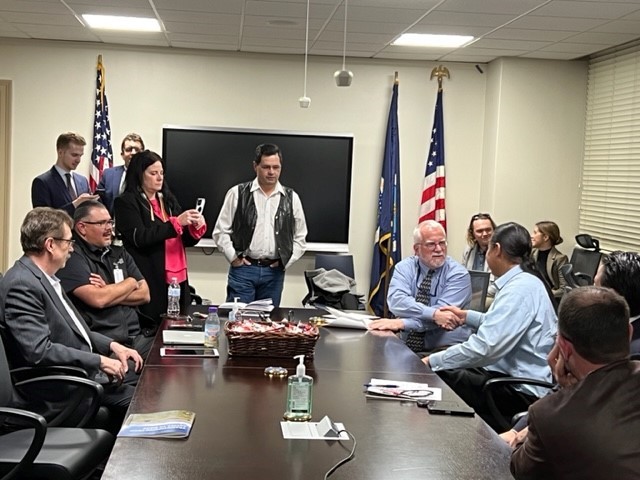Photo: Cheyenne River Sioux Tribe Chairman Ryman LeBeau shakes hands with USDA FSA Deputy Administrator Scott Marlow as FSA Administrator Zach Ducheneaux and Office of Tribal Relations Director (both Cheyenne River Sioux) look on, along with tribal leaders and advocates.
On Wednesday, March 1, COLT leaders cheered as Cheyenne River Sioux Tribe Chairman Ryman LeBeau inked the Tribe’s partnership with the U.S. Department of Agriculture (USDA) to help conserve, maintain and improve grassland productivity, reduce soil erosion, and enhance wildlife habitat through the Conservation Reserve Enhancement Program (CREP). COLT Member Tribes, the Cheyenne River, Oglala and Rosebud Sioux Tribes are entering into CREP agreements with USDA’s Farm Service Agency (FSA) to enroll eligible grassland, pastureland, and other agricultural lands within the boundaries of their reservations in this conservation program. https://fsa.usda.gov/news-room/news-releases/2022/usda-and-three-tribal-nations-to-enter-historic-conservation-reserve-enhancement-program-agreements-to-support-working-lands-conservation.
The Conservation Reserve Enhancement Program (CREP) is a part of the Conservation Reserve Program (CRP), the country’s largest private-land conservation program. Administered by the Farm Service Agency (FSA), CREP leverages federal and non-federal funds to target specific State, regional, or nationally significant conservation concerns.
In exchange for removing environmentally sensitive land from production and establishing permanent resource conserving plant species, farmers and ranchers are paid an annual rental rate along with other federal and non-federal incentives as specified in each CREP agreement. Participation is voluntary, and the contract period is typically 10-15 years.
Enrollment for producers is available year-round as signups are ongoing. Interested producers should contact their local USDA Service Center to learn more or visit the CREP for Producers webpage.
The 2018 Farm Bill broadened the types of partners USDA can work with under CREP. In addition to working with State and Tribal Governments, USDA can now partner with a wide-range of Non-Governmental Organizations (NGO) such as non-profits, private companies, and foundations. FSA encourages conservation partners to consider supporting a CREP project. Interested partners should contact their CREP Regional Specialist or visit the CREP for Partners webpage.
Congratulations to the Cheyenne River, Oglala and Rosebud Sioux Tribes for leading the way on conservation in Indian Country!

